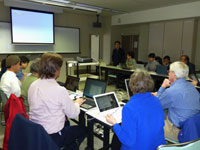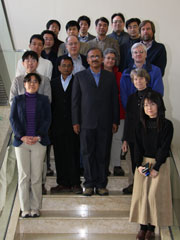[Last Update] 2010-02-12
 Dr. Makiko Ohtake of JAXA, Principal Investigator of the Multiband Imager of the lunar orbit explorer "KAGUYA" (SELENE), who also serves as Adjunct Assistant Professor of the University of Aizu Graduate School, organized a workshop for lunar data calibration and validation (CalVal Workshop) at the University of Aizu from Feburuary 3 to 5.
Dr. Makiko Ohtake of JAXA, Principal Investigator of the Multiband Imager of the lunar orbit explorer "KAGUYA" (SELENE), who also serves as Adjunct Assistant Professor of the University of Aizu Graduate School, organized a workshop for lunar data calibration and validation (CalVal Workshop) at the University of Aizu from Feburuary 3 to 5.
This workshop followed another conference on "KAGUYA", the "4th KAGUYA (SELENE) Science Working Team Meeting" in Tokyo which was held until the previous day. 18 world-class top scientists from Japan, USA, Europe and India, including Professor Carle Pieters (Brown University), a leading scientist of the lunar and planetary science, who received the 2010 G.K. Gilbert Award for her important achievement of the discovery of water molecules on lunar surface, joined the meeting. Based upon the result of KAGUYA, that has replaced remote sensing data sets of the moon, participants discussed global standardization of lunar data calibration and validation which were obtained through each country's mission and also determined the direction of the discussion.
This workshop receiving an attention of space agencies in the world was jointly held with JAXA because the University of Aizu since the University's CAIST/ARC-Space (Research Center for Advanced Information Science and Technology/Aizu Research Cluster for Space Science) has been deeply involved in this field of study. The names of institutes participating in the meeting were as follows.

Participants from around the world
| Japan | Institute of Space and Astronautical Science (ISAS) of JAXA |
|---|---|
| National Institute of Environmental Studies (NIES) | |
| The University of Aizu | |
| USA | Jet Propulsion Laboratory of NASA |
| Brown University | |
| The University of Maryland | |
| Analytical Imaging and Geophysics, LLC | |
| India | Space Applications Center of Indian Space Research Organization (ISRO) |
| Europe (Germany) | Max-Planck Institute |
- * G. K. Gilbert Award (Geological Society of America)
- The award is named for G. K. Gilbert, who clearly recognized the importance of a planetary perspective in solving terrestrial geologic problems more than 100 years ago. The G. K. Gilbert Award is presented annually for outstanding contributions to the solution of fundamental problems in planetary geology in the broadest sense, which includes geochemistry, mineralogy, petrology, geophysics, geologic mapping, and remote sensing. Such contributions may consist either of a single outstanding publication or a series of publications that have had great influence in the field.


